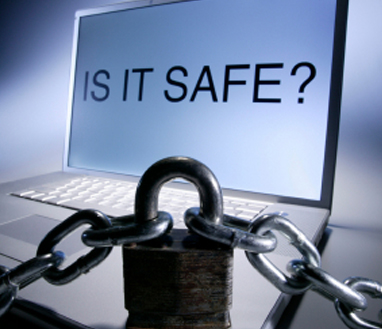

Everyone knows they need to ensure that the company is covered in the event of data loss or malicious attack, but it is often put off and not given the attention it deserves. Here at Mamu Computing we understand that computer security is often pushed to the bottom of the to do list, especially as the responsibility is often appointed to someone who is by no means an expert in the field. Even if systems and procedures are in place they are regularly neglected as they often require too much time to carry out or the reminders about updates pop-up at inconvenient times and simply become a nuisance.
That's why at Mamu Computing we provide solutions that keep your data and computer systems safe with as little input from your employees as possible. Your data can be automatically backed up and your anti-virus and firewall software can keep itself up-to-date, prevent any intrusions and block viruses without having to interrupt what you're doing with status updates. We believe that security systems should manage your security while remaining barely noticeable.
All our security solutions are tailored to your existing IT equipment and security requirements, so give us a call to discuss your circumstances.
| Unsure of some of the terms we've used? We've handpicked a few definitions for you below, or you can visit our glossary for a comprehensive list. Click on 'read more' to see the full definition. | |
| Antivirus: Antivirus software is used to detect and remove malignant programmes on your PC or mobile device, as well as providing protection against threats. Whilst most people are aware that antivirus protects against computer viruses, it should also... read more | |
| Backup: A backup is a copy of one or more files that can be used in case the original files become irreparably damaged or unusable. As hard drives can fail or become corrupted over a period of time for a number of different reasons, it is recommend... read more | |
| Data Management: Data management is the way in which computer data is handled and managed, and incorporates everyone from individuals right up to very large organisations. Whereas individual users will find that regular back-ups and up-to-date security and ... read more | |
| Firewall: A firewall is a security device that is used to keep networks and internet connections secure. It analyses incoming and outgoing network traffic, denying unauthorised connections in order to prevent against threats that may cause damage to ... read more | |
| Malware: Malware, or malicious software, is a generic name for programs that are designed to do damage, steal personal details or otherwise perform hostile or unwanted actions on a user's system. This includes viruses, worms, trojan horses, spyware ... read more | |
| Pop-Up: A pop-up is an advert that appears in a new window whilst users are browsing the internet. The adverts are generally not related to the site that the user is on, and usually appear when users first visit a web page or close a window. Some p... read more | |
| RAID: RAID (redundant array of independent disks) is storage technology for combining several disk drives in order to increase performance, resiliency and/or capacity, depending on the RAID architecture used. RAID systems can operate at a lower l... read more | |
| Spam: Originating from a Monty Python sketch, the term spam refers to unsolicited adverts sent to users by email, instant message, text message and other media. Because there is little to no cost incurred for the sender, and no real way to trace ... read more | |
| Spyware: Spyware is a type of malware that collects information about users without their knowledge or permission, including personal data, browsing habits and online banking information. Spyware can also install additional software, change computer... read more | |
| Trojan: Much like the Greek legend, a trojan is a type of malware that masquerades as a genuine, legitimate program but steals information or causes large amounts of damage once installed. Trojans give hackers remote access to an infected system, ... read more | |
| Uninterruptable Power Supply (UPS): A UPS is designed to protect your computer equipment from power failure and surges. A UPS sits between your computer and the mains power; if the power is cut the computer continues to run from the UPS battery, protecting your hardware and s... read more | |
| Virus: The term virus is often used to describe all sorts of malware, but the term refers specifically to malicious programs that have the ability to replicate and spread from one system to another. The most common way of spreading a virus is thro... read more | |
| Worm: A worm is a type of malware that replicates itself to spread to other computers via a network. Unlike viruses, however, worms tend to attack the network rather than the computer itself, increasing network traffic and overloading the network... read more |